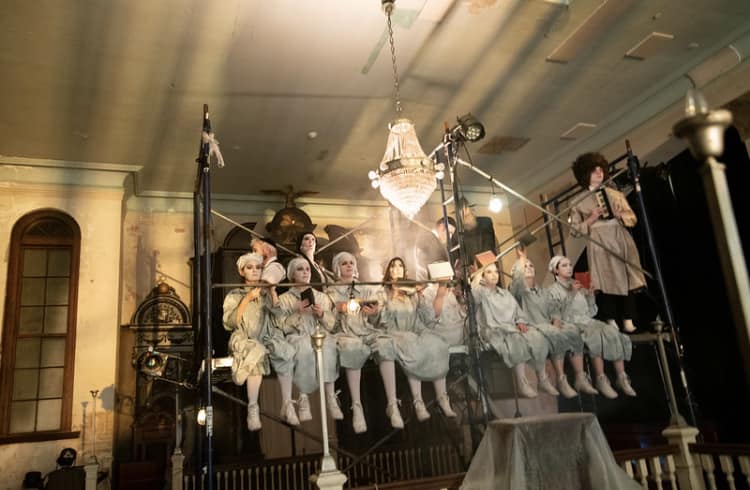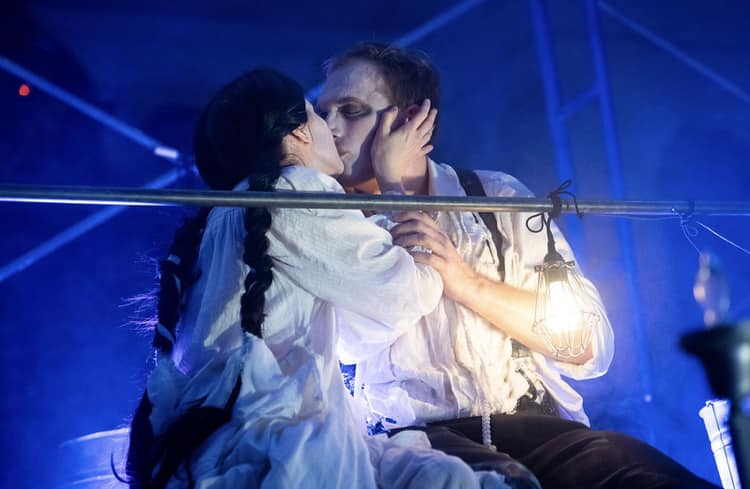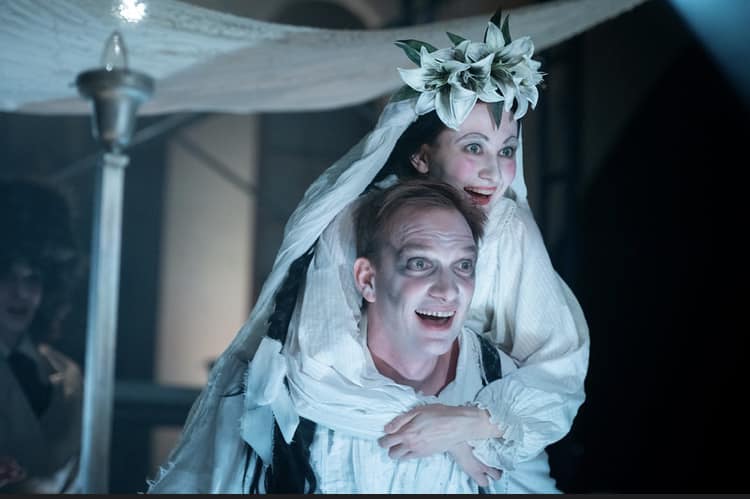
“The Dybbuk”. Written by Roy Chen. Based on the original play by S. Ansky and adapted by Igor Golyak with Dr. Rachel Merrill Moss. Directed by Igor Golyak. Presented by Arlekin Players Theatre at the Vilna Shul, Boston’s Center for Jewish Culture, 18 Phillips Street, Beacon Hill, Boston, through June 23rd.
By Michele Markarian
There’s an Old World, otherworldly feeling of the Vilna Shul, one of the oldest immigrant synagogues in the United States, with its high, cracked ceilings, elaborate chandeliers and Hebrew names engraved on the walls. Plastic and scaffolding are in the center of the long rectangular room, with the sound of water dripping. The house manager announces that the show will be one hour and fifty minutes without an intermission. My friend and I look at each other; the dismay and fear on her face mirrors my own. Little did we know that one hour and fifty minutes later, we wouldn’t want “The Dybbuk” to end. It’s a stunning, spiritual production where the worlds of the living and the dead are never far from one another. While this is a world premiere, coincidentally, Ansky’s original version was performed in Yiddish by the Vilna Troupe.

A dybbuk is believed to be a deceased, restless, and disembodied spirit who must enter the soul of a living human in order to purify themselves. When the play opens, Khanan (Andrey Burkovskiy) is attempting to pray but is distracted by the echoing sound of a woman’s laughter. “But you see how she gets in the way of me serving you,” he says to God. “Master of the Universe, help me to ascend with your heavenly power.” He can’t ascend, which is why he is a dybbuk. His earthly self was betrothed to his childhood friend Leah (Yana Gladkikh), whom he is in love with, but her father, Sender (Robert Walsh), who promised Khanan’s parents his daughter would wed their son, reneges in favor of a Manashe (Fedor Zhuravlev), a man with better prospects. Khanan kills himself and proceeds to make sure that Leah will wed only him, even in death. Their enmeshment is such that it’s difficult to determine which one of them is the dybbuk, which is what makes this so incredibly affecting. Khanan and Leah alternately reject, haunt, and pursue one another, even in death.
From beginning to end, this production is marvelous. The multi-leveled set, designed by Igor Golyak and Sasha Kuznetsova, allows the actors ample room to actively pursue one another, beseech their Maker, disrupt a wedding, and dance, depending on the scene (there’s a song break in the middle of the show that is surprising and wonderful – we blasted the song afterwards in the car all the way across the river). Costumes and props, designed by Sasha Ageeva, are breathtaking, particularly the recreation of a Mikveh as well as the representation of suicides. Anna Furman’s hair and makeup are apt; you are always aware of who the dead are. Fedor Zhuravlev’s composition and sound design are, at turns, eerie, startling, and beautiful.

But it is Burkovskiy and Gladikh who are the heart and soul of “The Dybbuk.” They are well paired – physically, Gladikh is the yin to Burkovskiy’s yang. While he is aggressive, she is yielding, yet somehow, he manages to project vulnerability while she projects strength. They are also athletes who move well along the scaffolding and with each other. Aided by a strong supporting cast, with Deb Martin as Leah’s Grandmother, they personify the essence of restless, destructive, and creative attachment. The interplay between the living and the dead is so magnetic that you really feel as if you’re living between two worlds. And somehow, in all of this, director Golyak manages to find humor amidst the pain and pathos.
This review was preceded by a lot of texts to friends – “I just saw a show I think you’ll really like – ‘The Dybbuk’.” Think of this as my text to you. It’s not every day you get to witness true art, but when you do, you’ll feel it in your bones. For tickets and information, go to: https://www.arlekinplayers.com/the-dybbuk/

